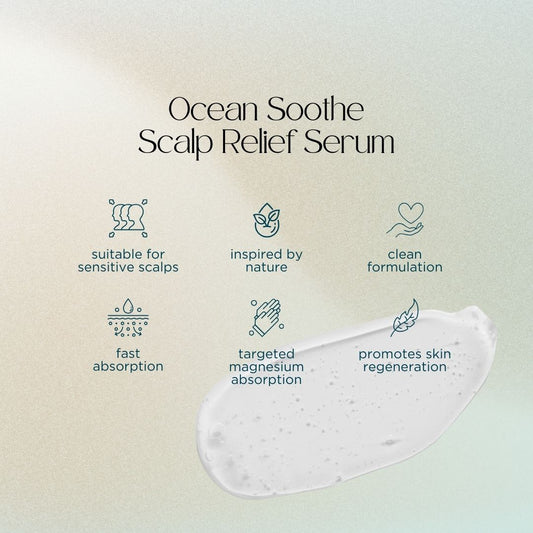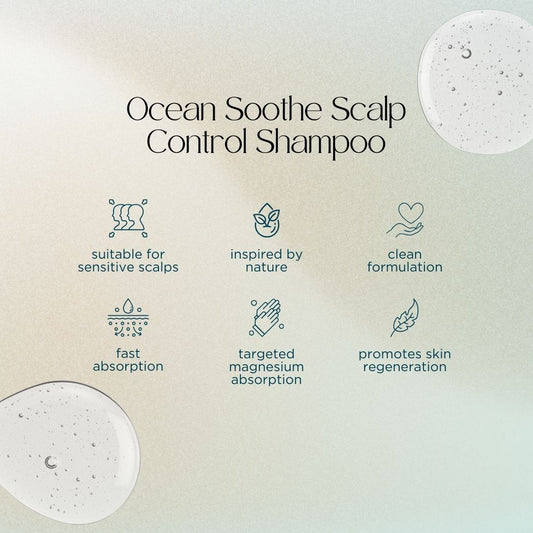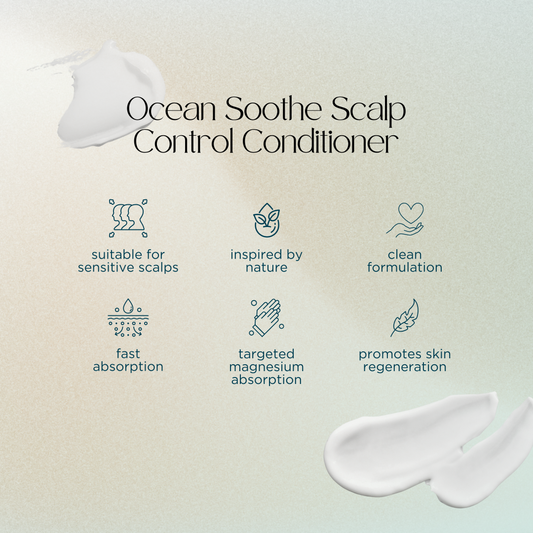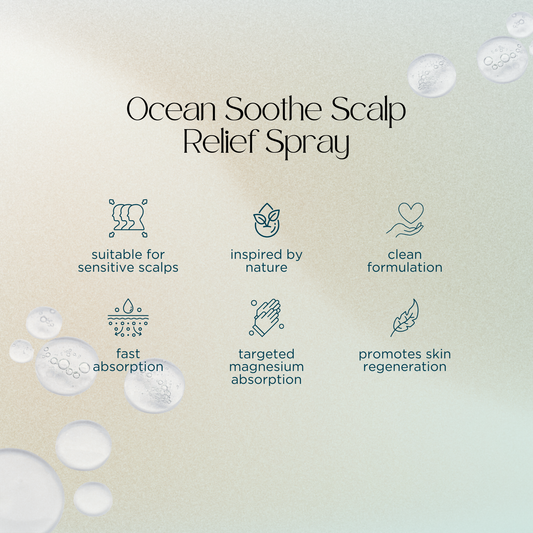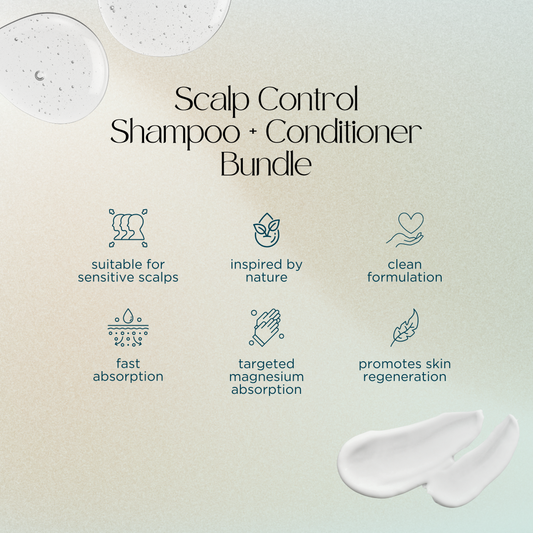Collection: Scalp Treatments
Dry Scalp Treatments
Do you catch yourself scratching your head for answers to relieve a dry scalp? Itching to find a flaky scalp treatment that works? First of all, don’t fret, but also please stop scratching. Dry scalp complaints are a lot more common than you think. There are so many people desperately searching for these answers, that thought we’d provide them!
What causes an irritated scalp?
Before we get onto dry scalp treatment options, let’s tackle the age old question- what is the cause of my irritated scalp? Much like Fergalicious does, let me spell it out for you…
H-Y-D-R-A-T-I-O-N (or lack thereof!).
Your skin is the body’s biggest organ! It literally covers you head to toe. A dry scalp is also known as dry skin on your head. It is like having dry skin patches on other parts of your body- like your elbows, arms and face.
So how do you know if you have an irritated scalp? The biggest signs are dryness, itchiness, and flakes!
Dry Scalp
When our scalp can’t retain moisture, it naturally becomes dry. If you cast your mind back to how your scalp felt in the winter, did it get worse? The answer is probably yes. This can be directly attributed to the drop in temperature and humidity. However, not all dry scalps are purely from the environment- there can be intrinsic or extrinsic causes to a dry scalp as well. These include:
- Excessive washing
- Shampoos, conditioners and serums that strip the natural oils from your skin
- Hot water showers
- Air conditioning
- Sunburn
- Skin conditions like psoriasis, eczema and dermatitis
Itchy Scalp
Itchiness is arguably the worst symptom of a dry scalp. It’s something you know you shouldn’t do, it isn’t going to provide you relief, and it is going to make the itching worse. How psychological is that! Itchiness can be the symptom of a dry scalp but also other conditions such as:
- Dandruff
- Reaction to a hair product
- Lice
- Psoriasis scalp
- Atopic dermatitis
- Eczema
Flaky Scalp
The last dry scalp symptom that makes you reconsider wearing a black t-shirt is flakiness. Unfortunately avoiding dark tops indefinitely isn’t the best flaky scalp treatment option. A flaky scalp can be attributed to factors like:
- Irritated, oily skin
- Dandruff
- Sensitivity to hair care products
- Over or under washing hair
- Skin conditions, such as psoriasis and eczema
As you can see- there is a big overlap between a dry, itchy and flaky scalp. Your best bet in locating the dry scalp treatment option for you is to first pinpoint why you have these symptoms in the first place.
Dandruff vs dry scalp
As you probably figured from the subtitle- there is a difference between dandruff and a dry scalp. However, a dry scalp and dandruff present very similarly with symptoms like dryness, itchiness and flakiness all overlapping. The main difference is that a dry scalp is due to lack of hydration whereas dandruff is an inflammatory condition of the scalp. The main cause of dandruff is seborrheic dermatitis. In dandruff the scalp sheds skin faster than usual and is more oily. This build up of skin and oil is what contributes to the larger, more oily appearance of dandruff flakes, as opposed to the small, dryer flakes of a dry scalp.
Is dandruff caused by dry or oily scalp?
Dandruff presents as an oily scalp as opposed to a dry scalp because the seborrheic dermatitis affects the oil glands on the scalp. An excessive buildup of oil and dead skin is the perfect concoction for dandruff flakes. In fact, often there is a fungus that grows on the scalp that makes the flakiness worse.
This scalp fungus is controlled by our immune system, so when our immune system takes a beating, the fungus on our scalp multiplies.
This means that a dry scalp can be managed well with lifestyle changes and appropriate scalp products however, dandruff is unlikely to resolve without a personalised treatment and advice.
Symptoms of a dry scalp
As we have established your scalp gets dry when your skin has too little moisture. The tell-tale signs of a dry scalp are:
- Flakes of dead skin (small and dry flakes)
- Itching and irritation
- Tight or dry feeling scalp
- Dry hair
How to treat a dry scalp
Being able to pinpoint what is causing your scalp woes is integral in finding the right dry scalp treatment, one that could potentially help prevent it occurring in the first place.
The first step in deciding what scalp treatment is best for you is to address your lack of moisture retention. So is your haircare contributing to your irritated scalp…
Overwashing your hair strips the scalp of its natural oils. These oils are integral in maintaining adequate scalp hydration. The other factor when it comes to a dry scalp, is the temperature of the water. Hot water is drying on the skin. Spending too long in the shower can also add to scalp irritation.
The next thing you need to look at is your current hair care products. It may be something you are putting on your scalp that is drying it out or making it hard to retain moisture. Good news for you is that we have put together a list of ingredients and general products to avoid when cleaning out the haircare cabinet. These ingredients include alcohol, harsh sulphates, silicons and other allergens. These are commonly found in hair mousse and dry shampoo.
So what ingredients do I look for in dry scalp treatment products? When looking for good shampoo and conditioners we look for hydrating ingredients (duh!). Some of the best ingredients include Hyaluronic Acid, magnesium, tea tree oil and shea butter.
However, sometimes using a hydrating shampoo and conditioner isn’t enough. There are specific scalp treatments, like topical serums and sprays that can boost moisture retention for your scalp!
Natural treatments for a dry scalp
Natural hair treatments are generally more gentle as well as less likely to cause irritation to a dry scalp than chemical formulas. Our top natural scalp treatment picks are:
- Use hydrating shampoos and conditioners. Our favourite is Abundant Natural Health’s Ocean Soothe Shampoo and Conditioner. Free from parabens and sulphates, Ocean Soothe nourishes your scalp whilst protecting your hair follicles. Its highly concentrated salt and magnesium formula helps to remove flakes and restore dry, irritated scalp.
- Add a topical scalp serum into your scalp routine! You know the saying “a little extra hydration goes a long way” (or something like that). We recommend using Abundant Natural Health’s Ocean Soothe Scalp Relief Serum or Ocean Soothe Scalp Relief Spray. Both are 100% natural and are effective in treating a dry scalp, an itchy scalp, and a flaky scalp (Hallelujah!). This leave in treatment is formatted into an easy-to-use canula tube, is absorbed quickly and, is odourless and non-greasy.
- Use warm water instead of hot water in your shower and bath to keep your skin and scalp moist. Don't stay under the water for longer than 5 or 10 minutes at a time. Spending too much time under hot water can strip your skin of its natural oils. Turn on a humidifier in your home to add moisture to the air.
- Stop the scratching. I repeat. Stop the scratching. Everyone knows that scratching is no good for your skin, no matter how good it feels. Scratching often makes your symptoms worse. Did you know that scratching causes small abrasions on the scalp which can become infected, red, inflamed and even more itchy! We recommend finding a magnesium rich scalp solution to soothe the itch. Our Ocean Soothe Scalp Power team is rich in organic magnesium- an essential element proven to reduce an itchy scalp!
Dry scalp treatments at home
We totally get it! If you’ve had a dry scalp for years, you’ve probably tried every product under the sun. Your faith in hair care brands can be jaded if products you’ve tried fail to make any impact on your scalp. Here are some DIY ideas that use everyday household products!
- Tea tree oil- a strong antiseptic, antifungal and very prominent in irritated scalp shampoos. Add some drops of tea tree oil to your current shampoo and conditioner!
- Coconut oil- massage a small amount of coconut oil into your scalp and let it sit for 10 minutes before washing your hair as you normally would.
- Apple cider vinegar- very similar to the regime of coconut oil. Apply 1 part apple cider vinegar to 2 parts water, let it sit on your scalp for 5 minutes before washing it out. Then continue washing your hair as per usual.
- Yoghurt and eggs – a little more obscure but both foods have hydrating properties. Mix a few tablespoons of yoghurt into a beaten egg and allow it to sit in your scalp for 10 mins before washing it out. Rinse with lukewarm or cold water- you don’t want to cook the egg!
Australian Made dry scalp treatments
If I told you that a product that fixes your dry, itchy and flaky scalp, uses natural ingredients AND is Australian Made exists, promise me you won’t fall off your chair… Abundant Natural Health’s Ocean Soothe Range really makes this dream come true! The Ocean Soothe range was formulated to capture the calming effect of the ocean on dry, itchy and irritated skin. The most powerful ingredient in the ocean that enhanced skin health was salt (NaCl) and magnesium. These powerful salts clean the scalp and promote its recovery! Abundant Natural Health has formulated both of these powerhouse ingredients into a scalp and hair care range. All specifically designed to relieve dry, itchy, and flaky scalps! Here are our top picks from the range!
- Scalp Power Team
- Ocean Soothe Shampoo
- Ocean Soothe Conditioner
- Overcoming Psoriasis Scalp Relief Bundle
Disclaimer: This Site Does Not Provide Medical Advice. The author of this blog is not a medical professional. Information is gathered and shared from reputable sources; however, Abundant Natural Health is not responsible for errors or omissions in reporting or explanation. This blog is intended for informational purposes only. It is not a substitute for professional medical advice, diagnosis, or treatment. By providing the information contained herein we are not diagnosing, treating, curing, mitigating, or preventing any type of disease of medical condition. Patients should not use the information contained in this blog to self-diagnose or self-treat any health-related condition. Never ignore professional medical advice in seeking treatment because of something you have read in this blog. Before beginning any type of natural, integrative, or conventional treatment regimen, it is advisable to seek the advice of a licensed healthcare professional.
-
Ocean Soothe Scalp Relief Serum (50mL)
Regular price $14.95 AUDRegular priceUnit price / per$14.95 AUDSale price $14.95 AUD -
Ocean Soothe Scalp Control Shampoo 300mL
Regular price $22.00 AUDRegular priceUnit price / per -
Ocean Soothe Scalp Control Conditioner 300mL
Regular price $20.00 AUDRegular priceUnit price / per -
Ocean Soothe Scalp Relief Spray (50mL)
Regular price $14.95 AUDRegular priceUnit price / per$14.95 AUDSale price $14.95 AUD -
Scalp Control Shampoo + Conditioner Bundle
Regular price $33.60 AUDRegular priceUnit price / per$42.00 AUDSale price $33.60 AUDSold out


